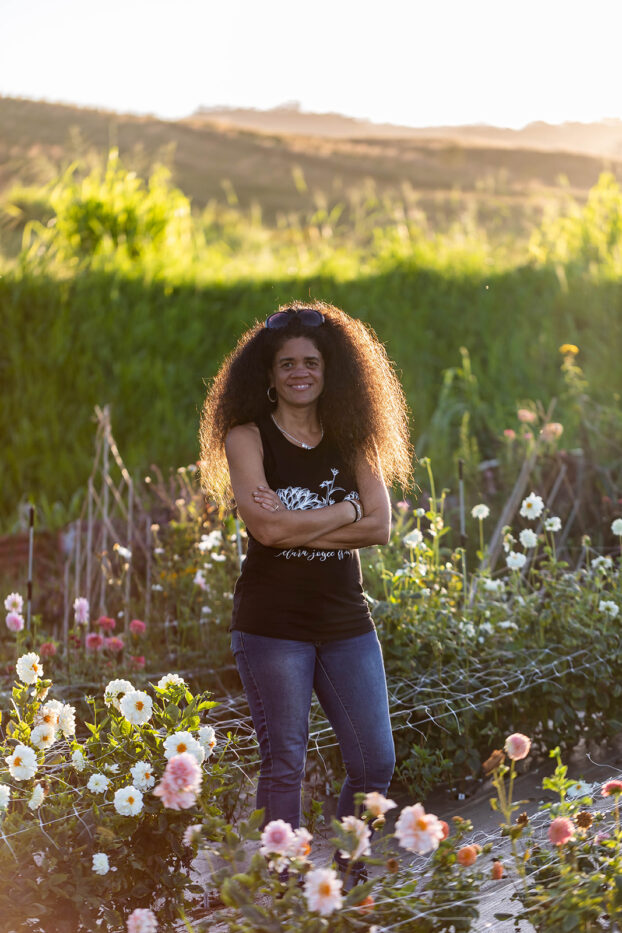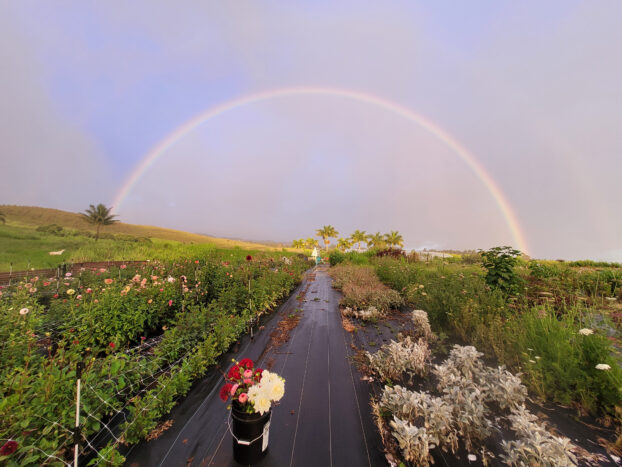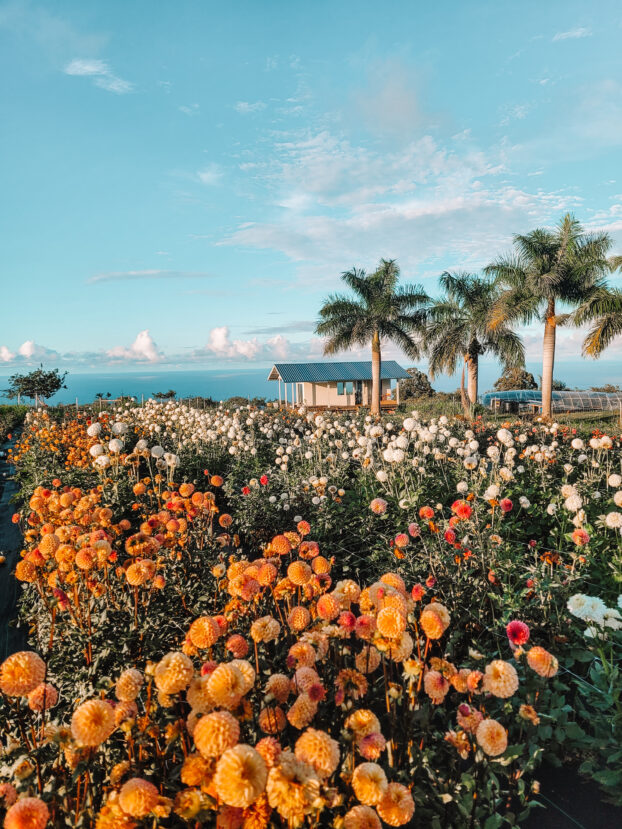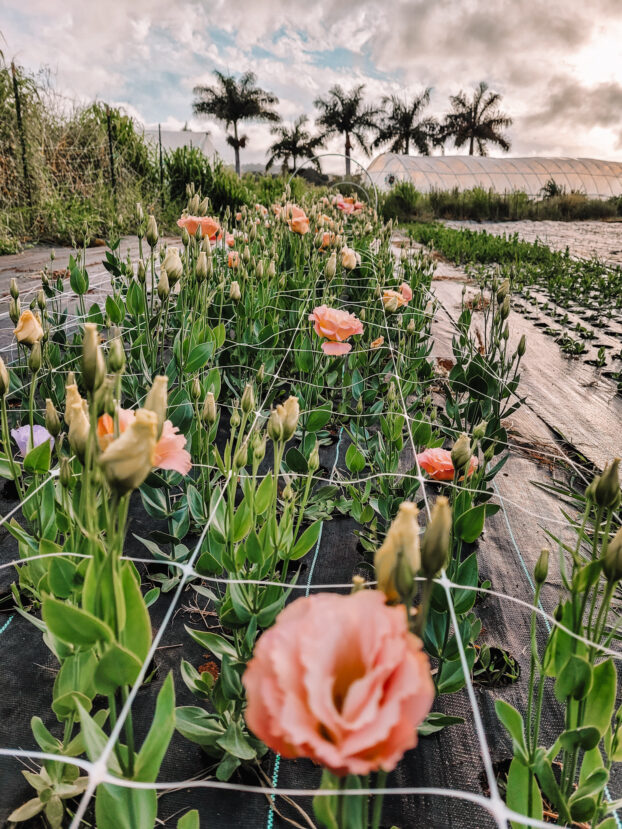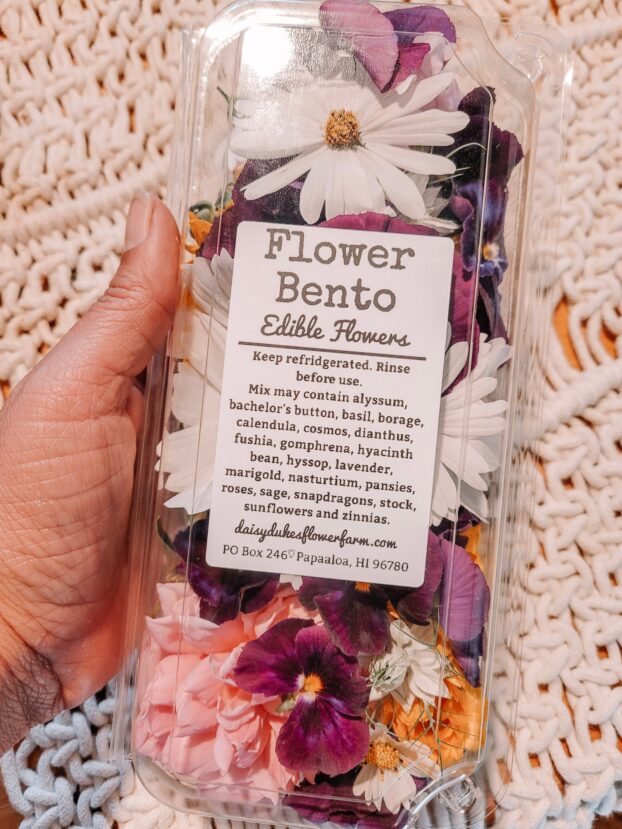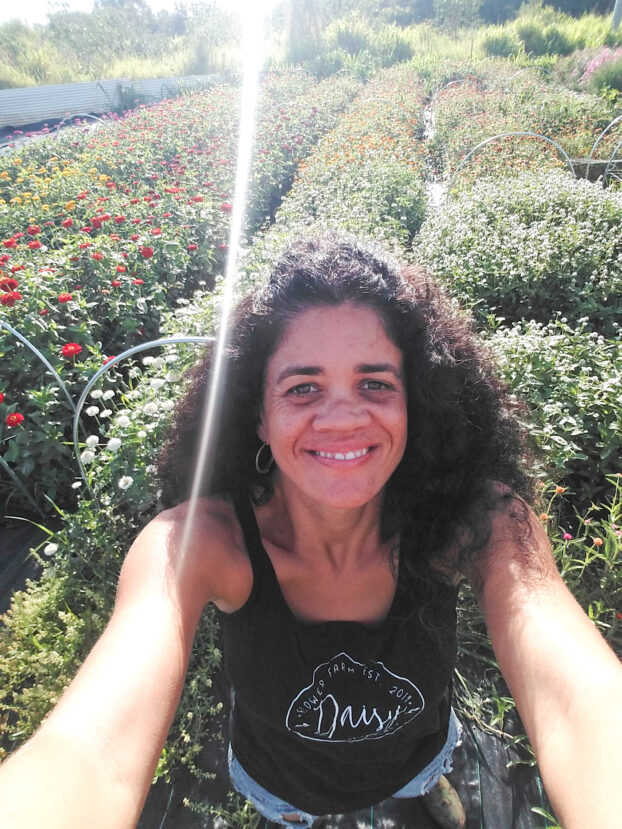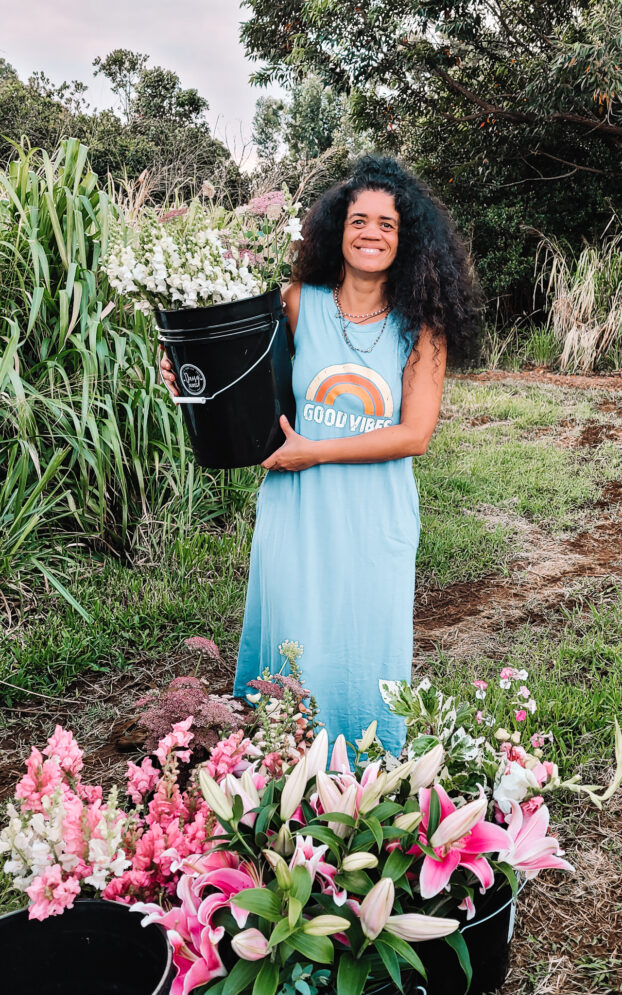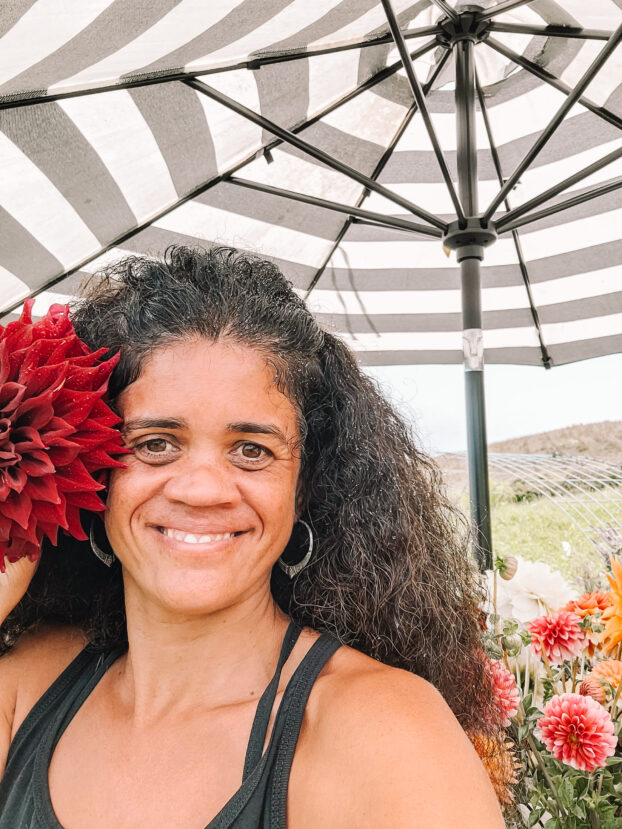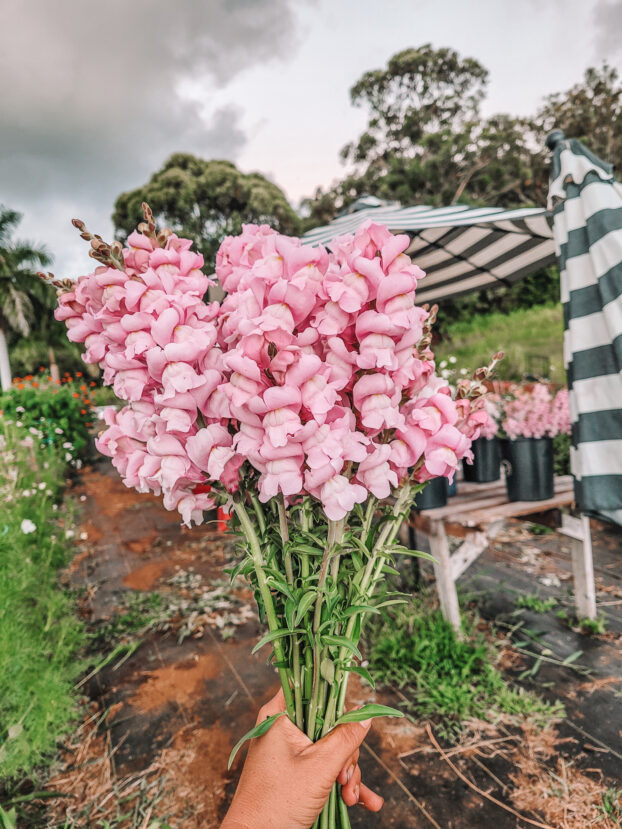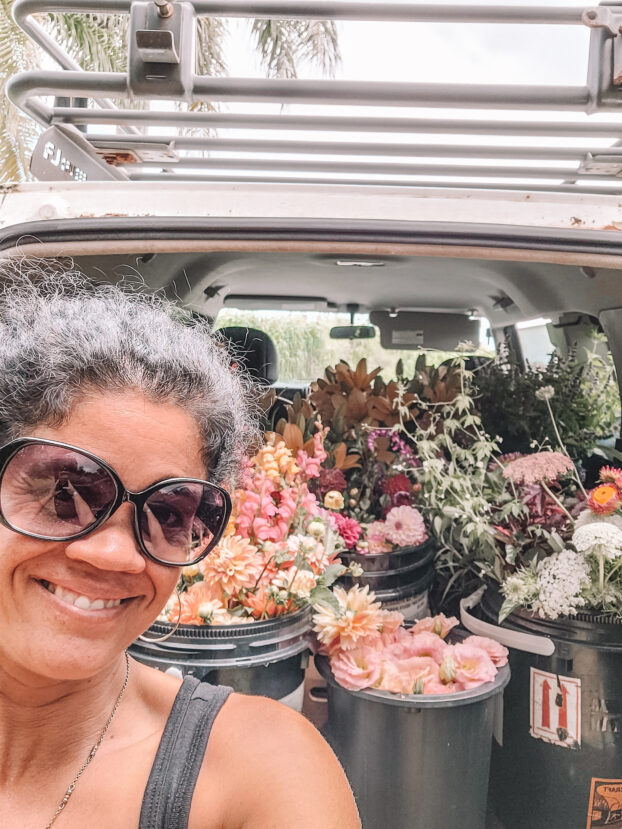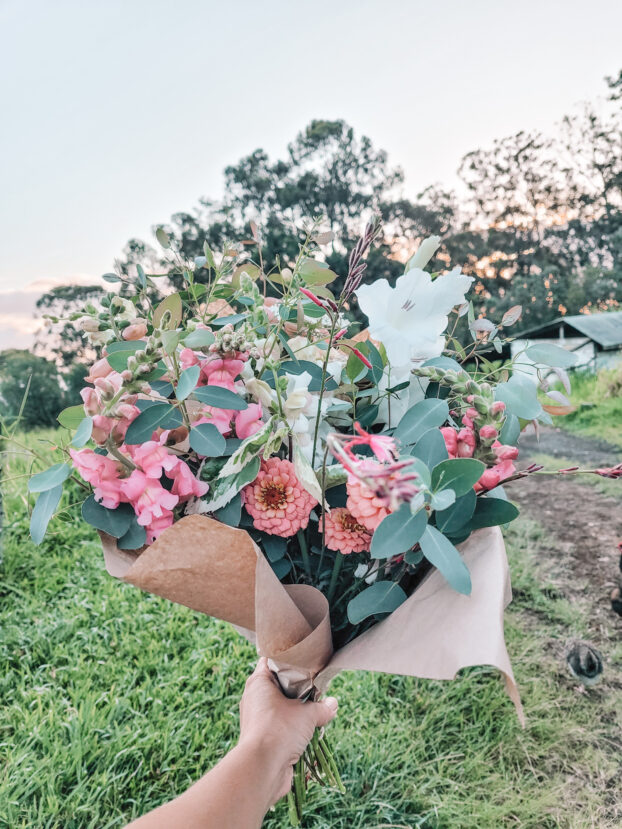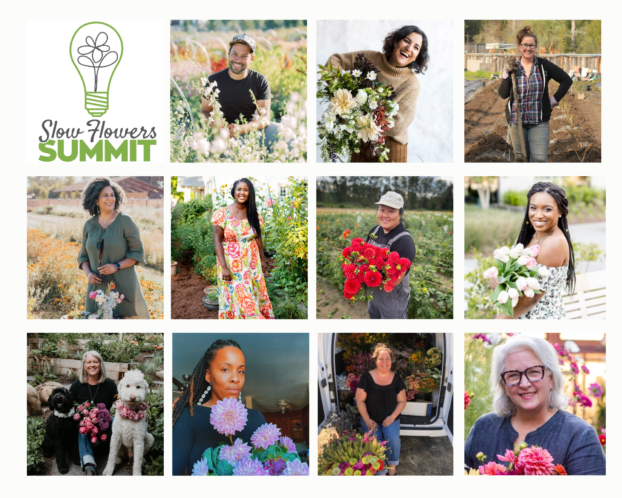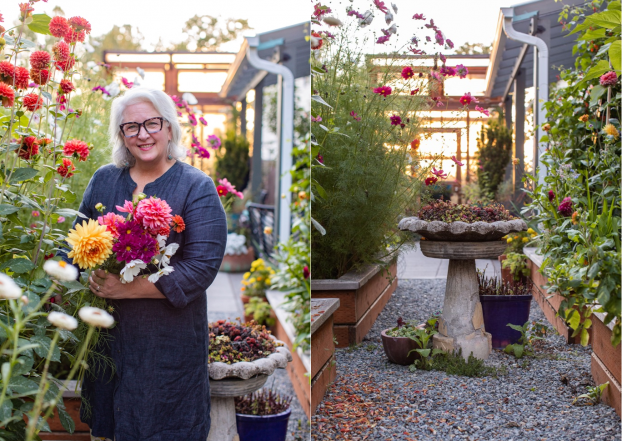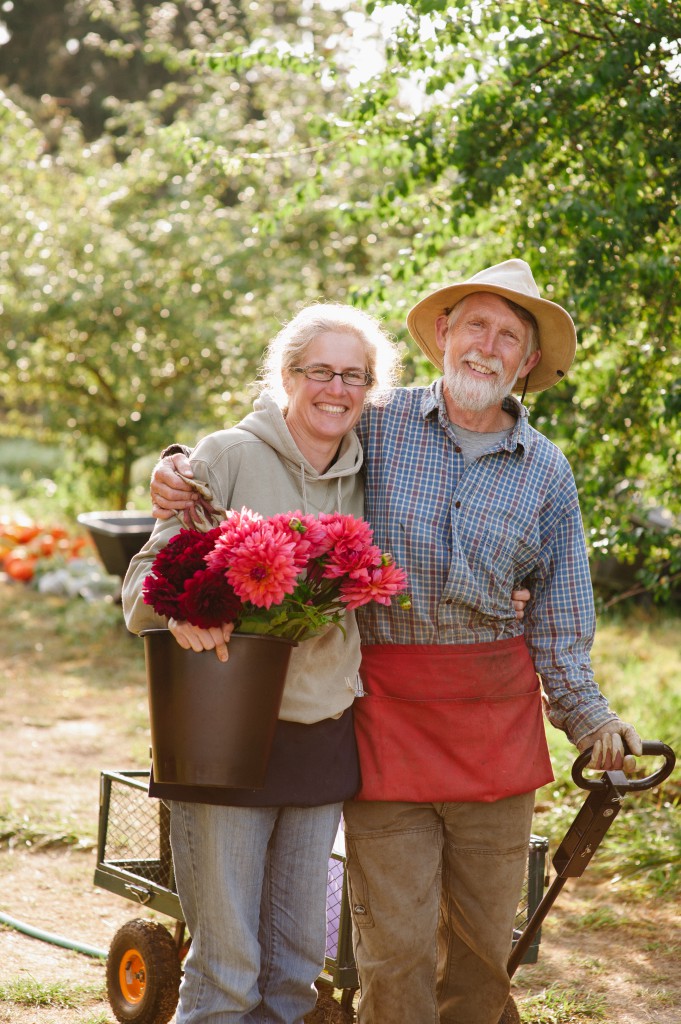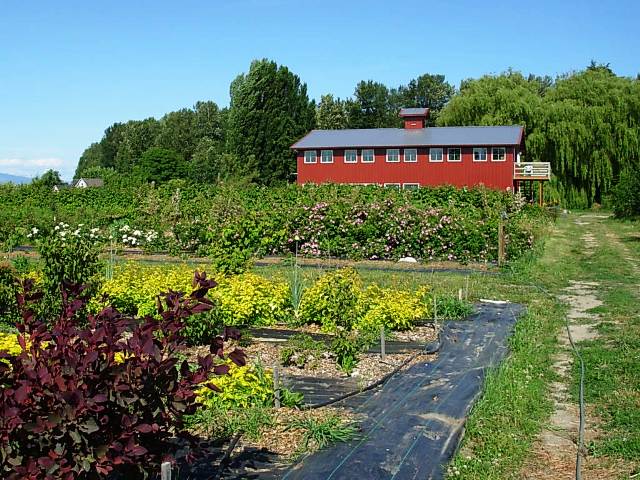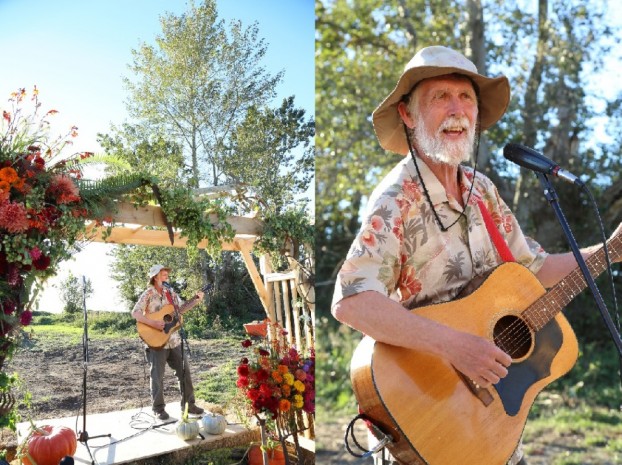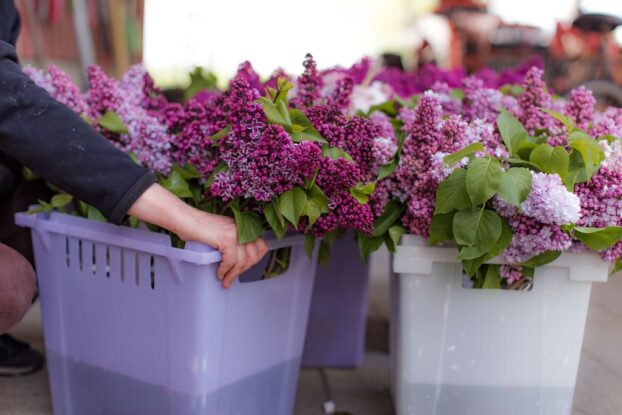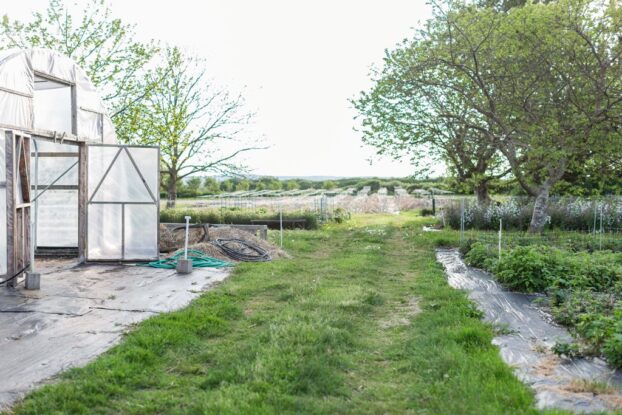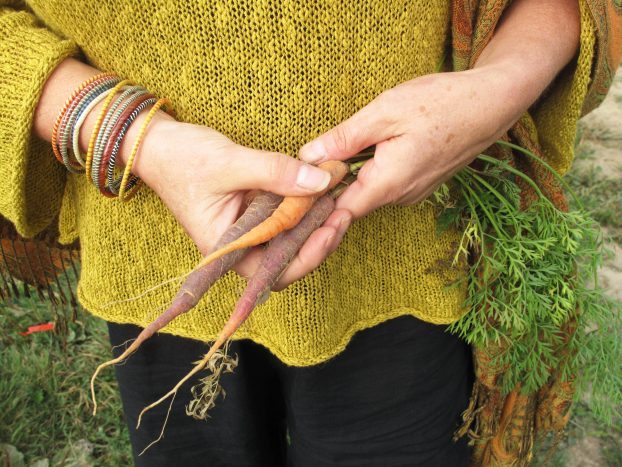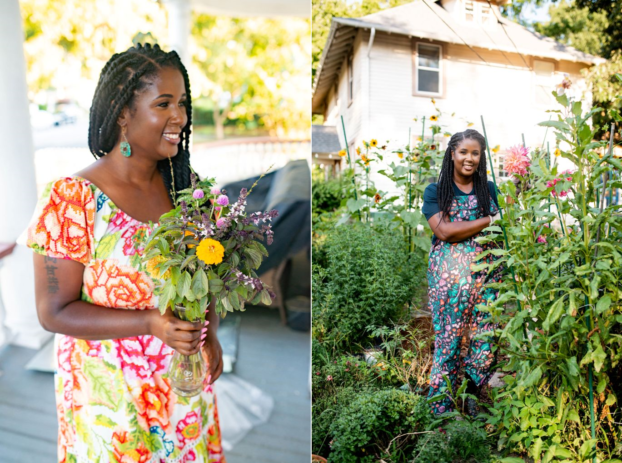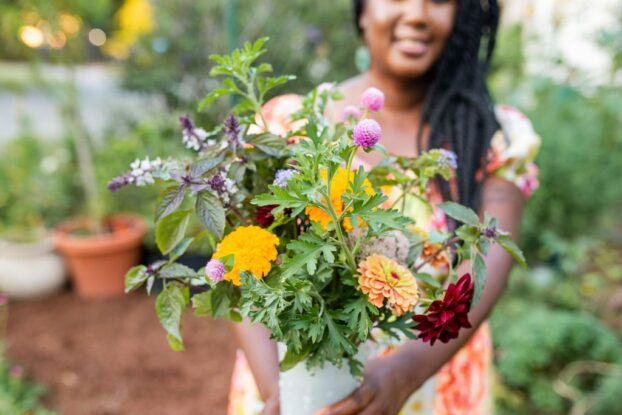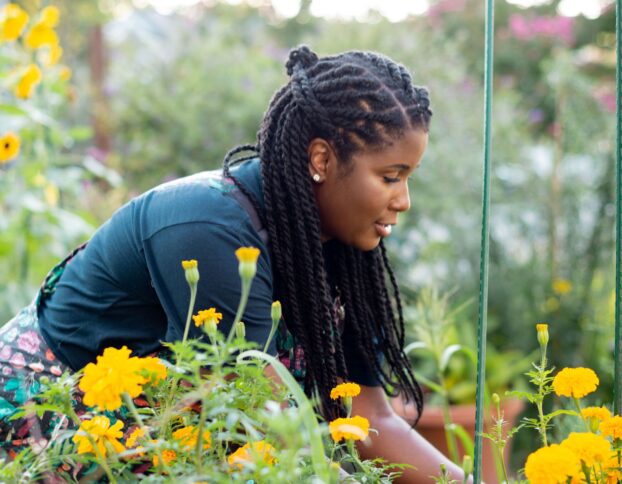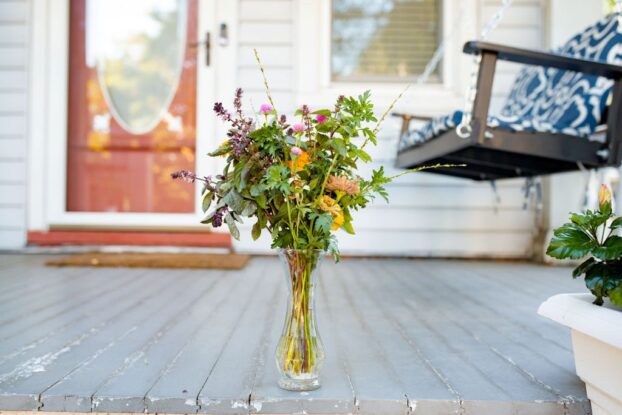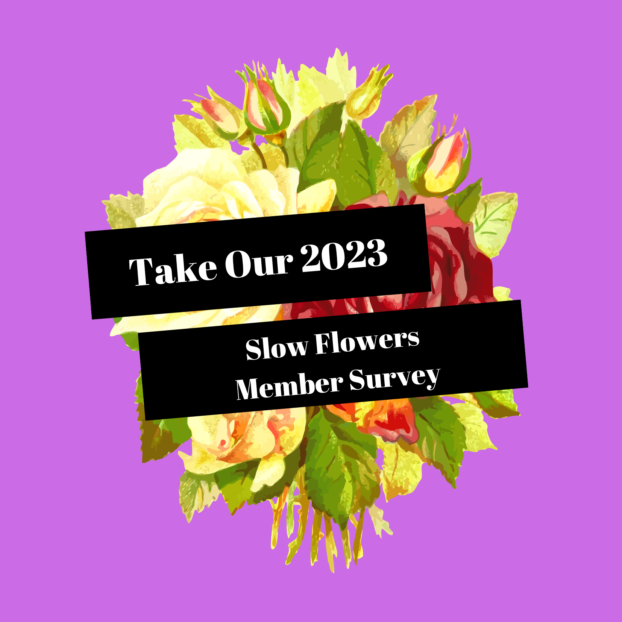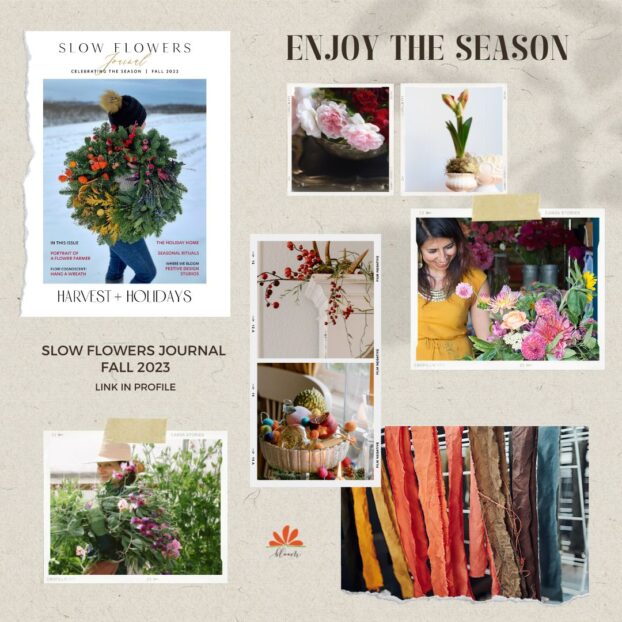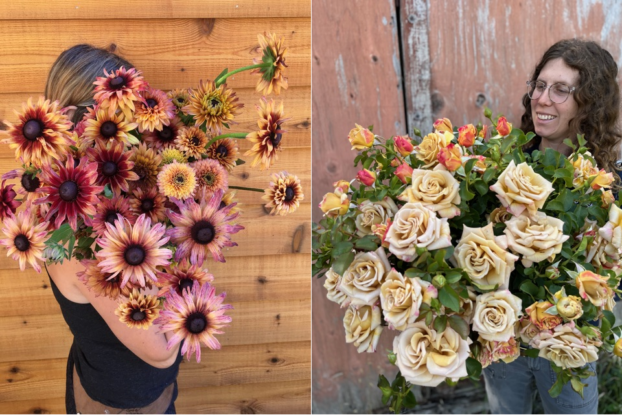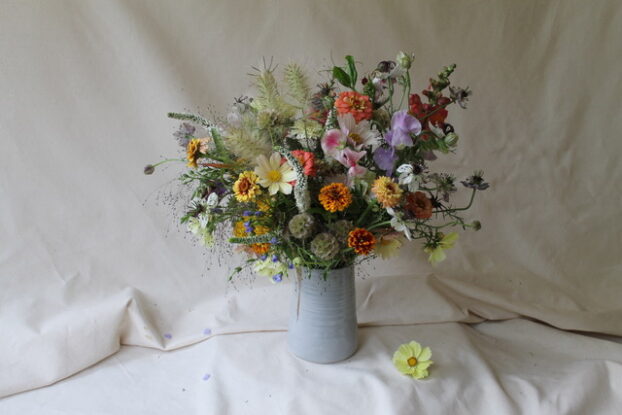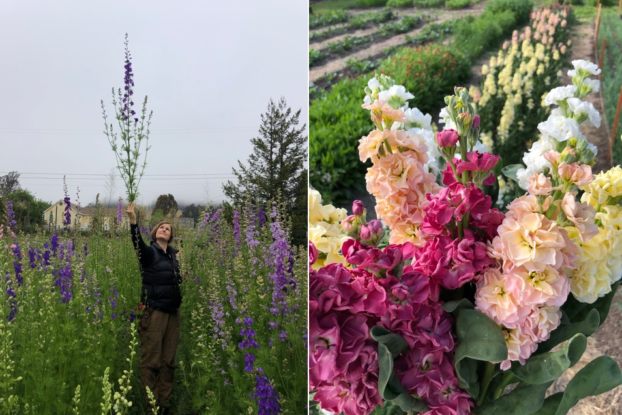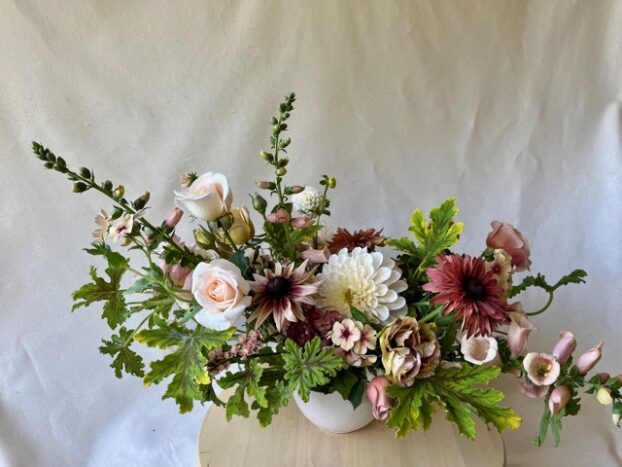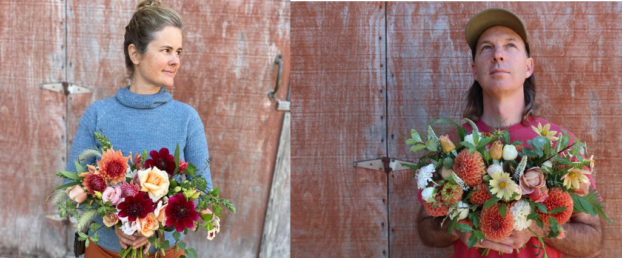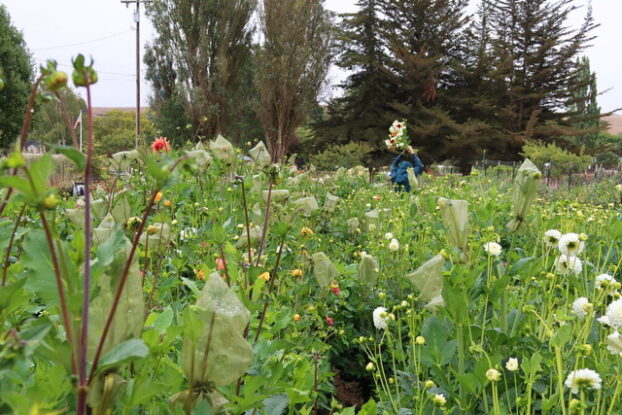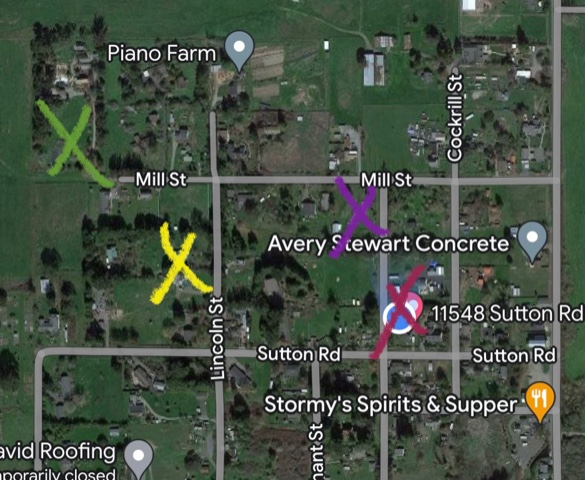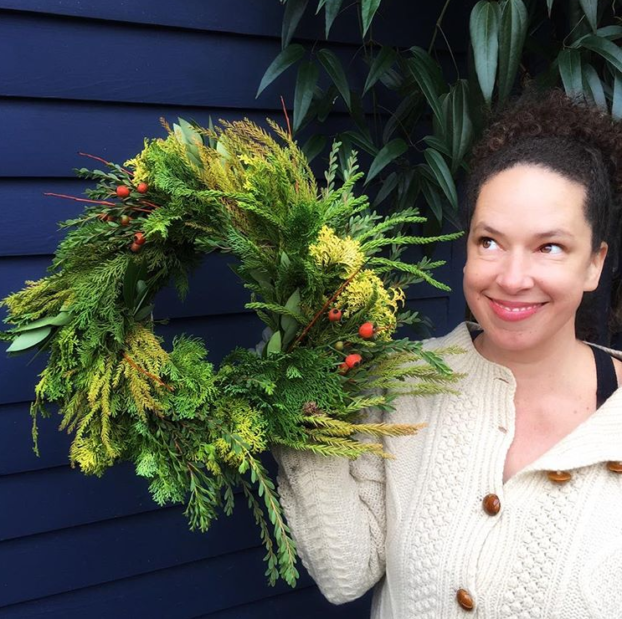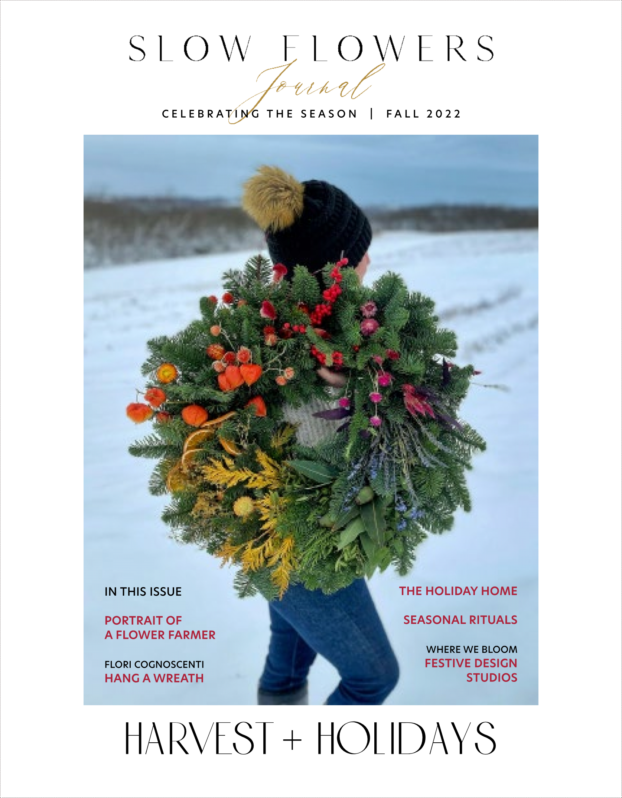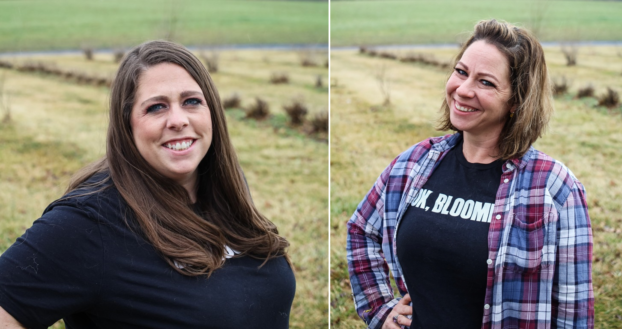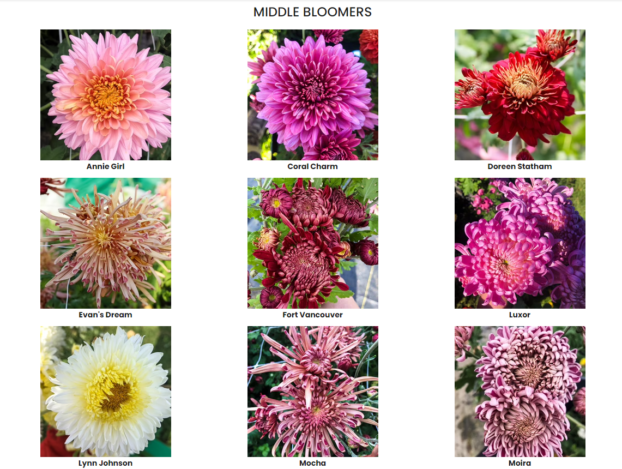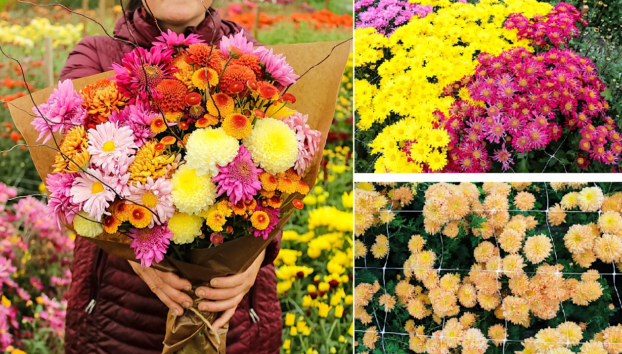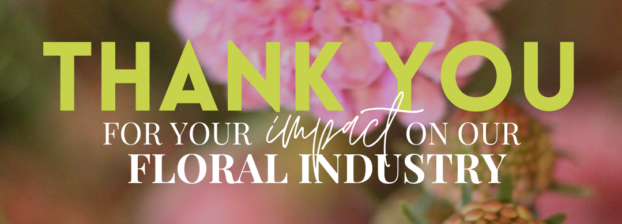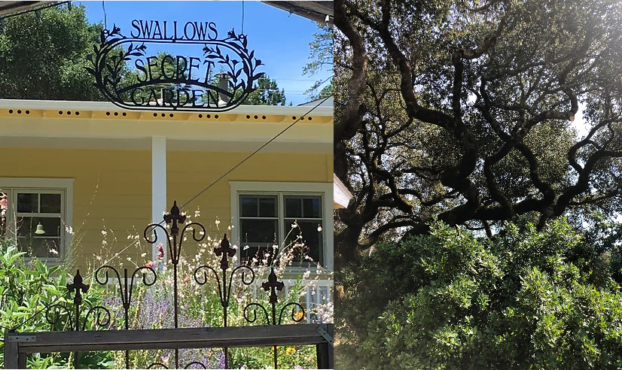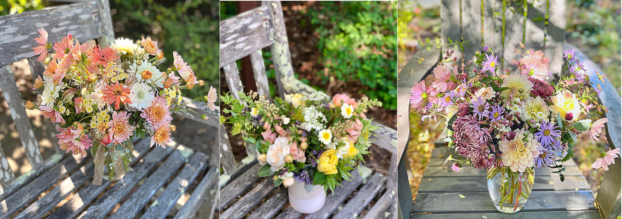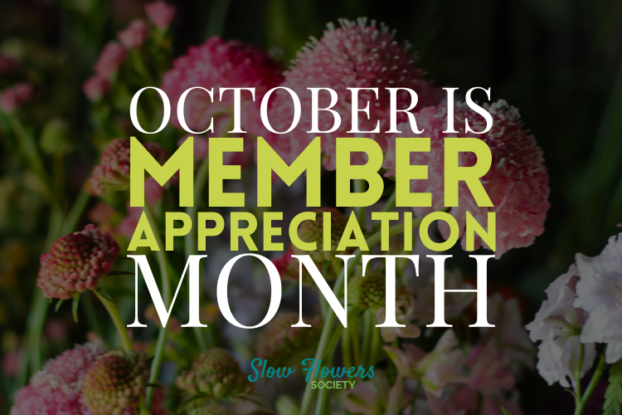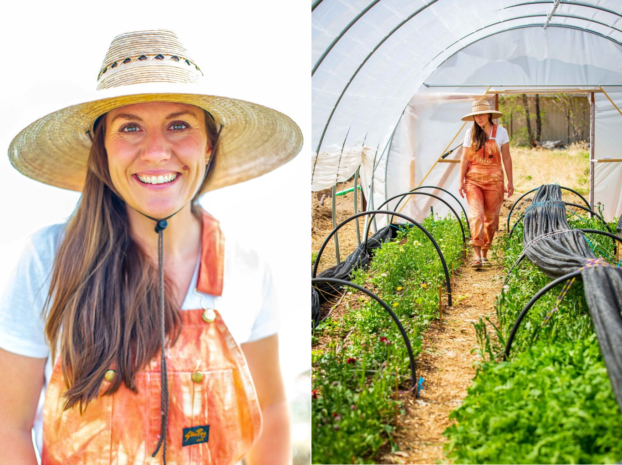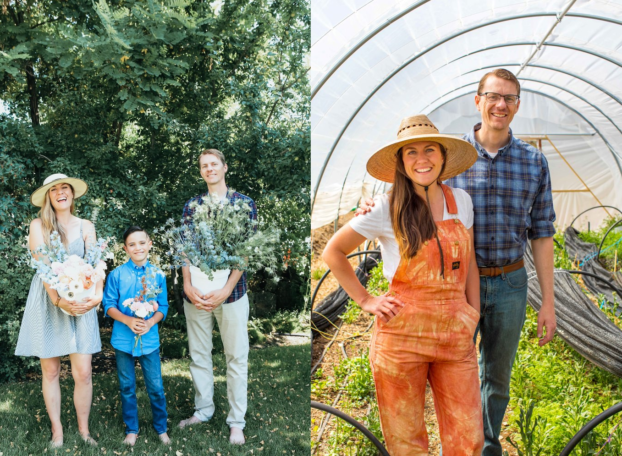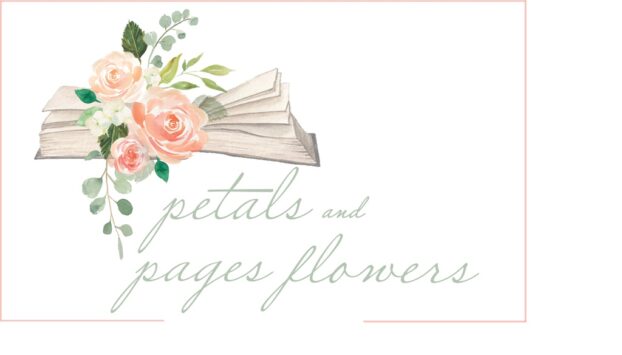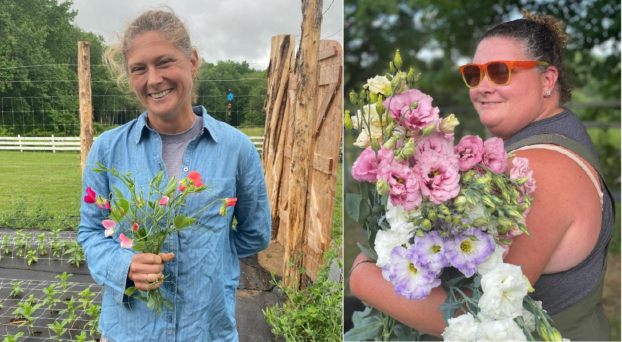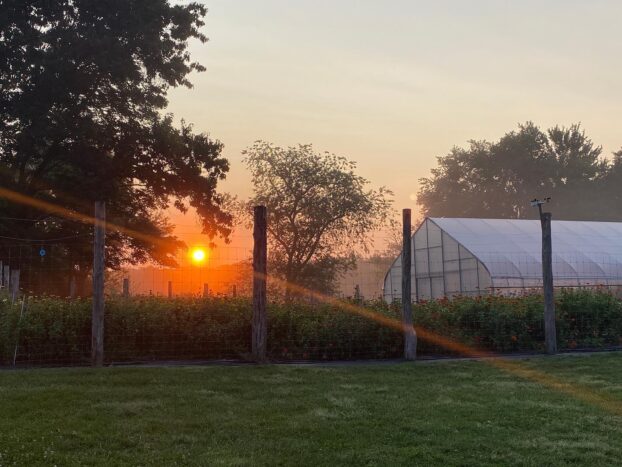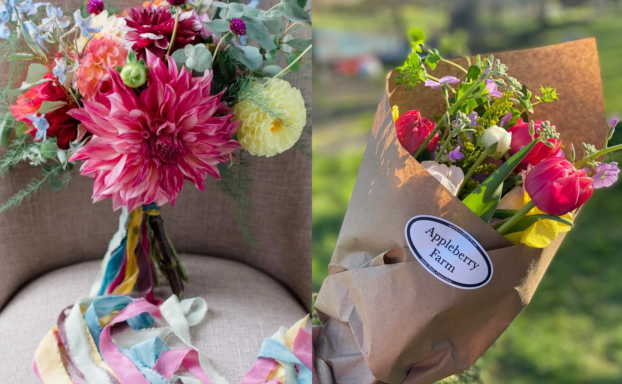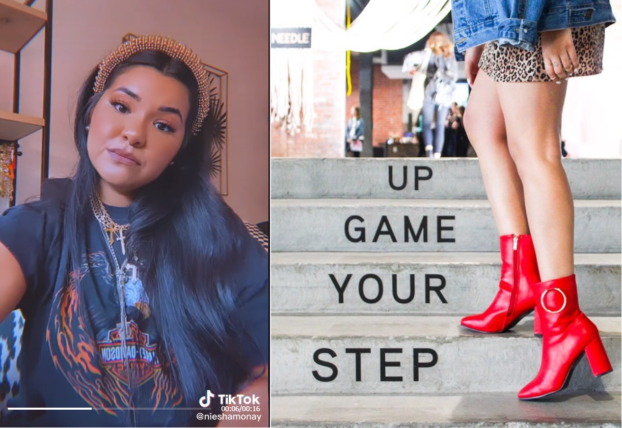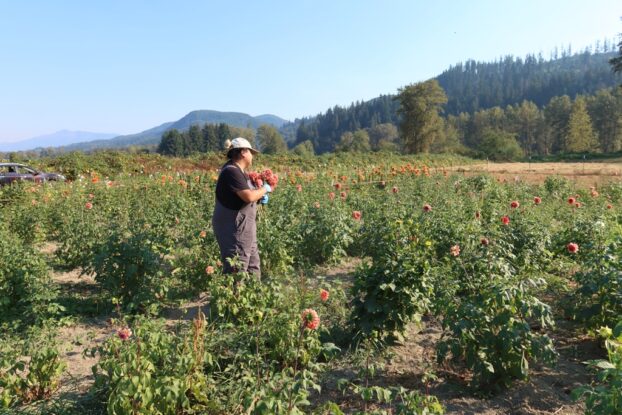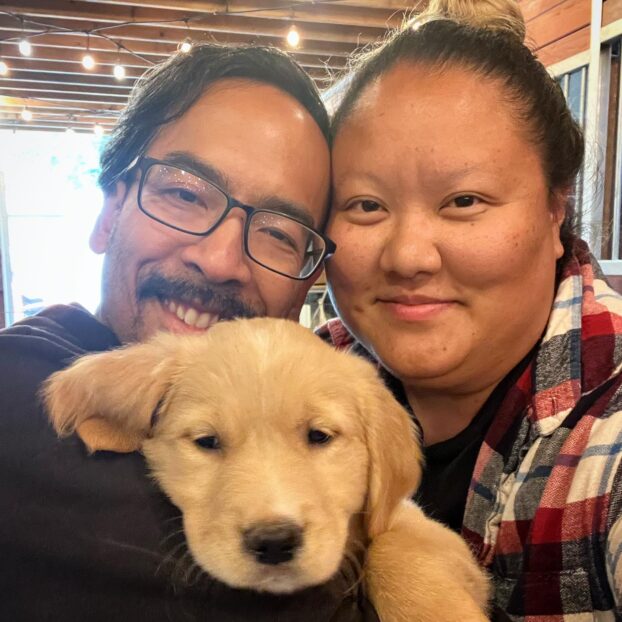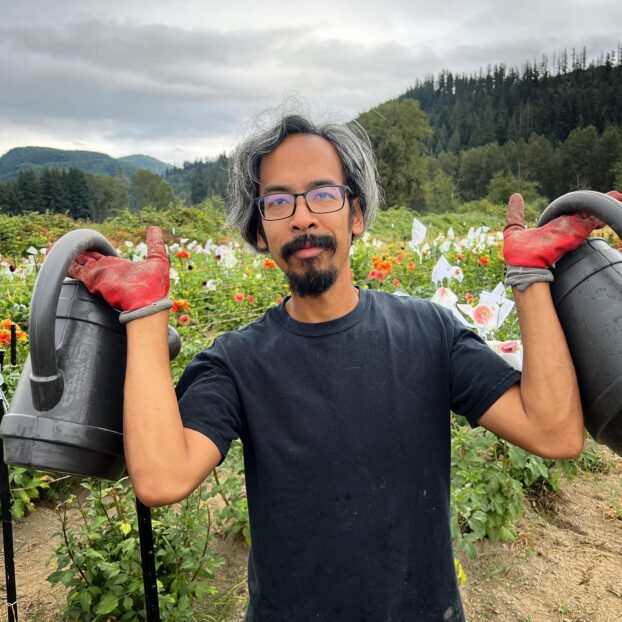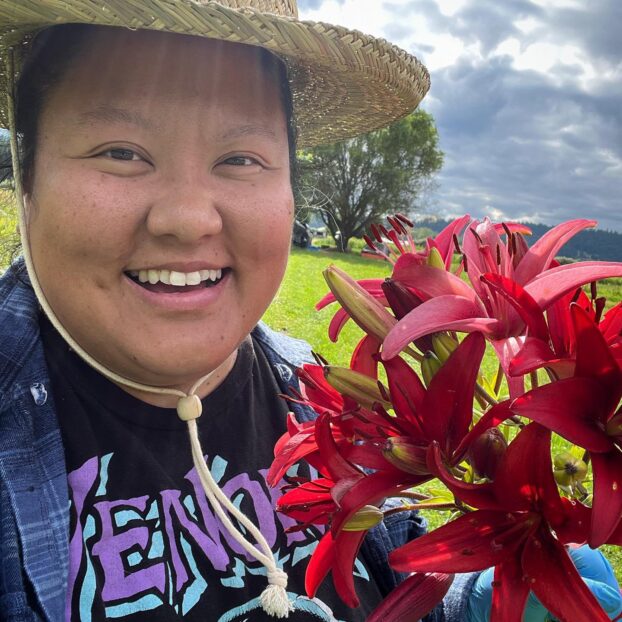Podcast: Play in new window | Download
Subscribe: Apple Podcasts | Podcast Index | RSS | More
Today, I want to share a bonus episode with you — an updated lecture originally created for the FREESIA Summit, held in September 2022. FREESIA is an acronym for Florists Recognizing Environmental & Eco-Sustainable Ideas & Applications and the online conference was produced by Hitomi Gilliam and Colin Gilliam.
The presentation is called “Walking the talk” and it examines our Slow Flowers’ values and concepts and discusses how our members are putting them into practice. In this episode, I’ll introduce you to several Slow Flowers Society members and highlight their stories. You can have all the theory you want, but implementing these values is what will help you build a sustainable brand for your business.
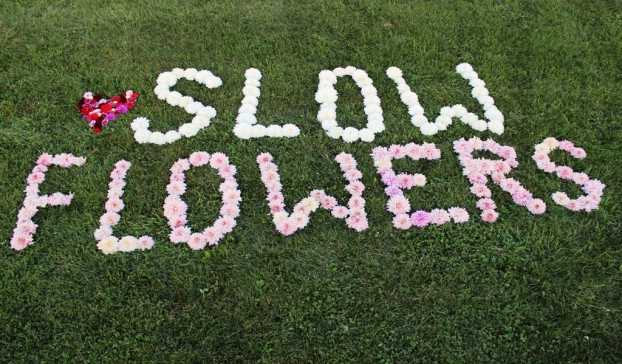
I first started writing about the concept of Slow Flowers more than 10 years ago, coining the phrase “Slow Flowers” as a way to describe the values of slow, seasonal and domestic flowers. We defined the term Slow Flowers and what it reflects as a cultural shift: “A movement that encourages consumers to purchase locally-grown flowers and connects them with the source, from the flower farmer to the floral designer.”
During one of the open chat sessions during the FREESIA Summit, an audience member commented: “We have to find a network of like-minded professionals to gather together and support our work,” and I had to pause and say: “That’s what Slow Flowers is!” That’s our laser-focused mission. Specifically, the Slow Flowers Movement has two audiences. We have the floral industry and we have consumers, and really, our message is constantly talking about the benefits of local, seasonal, and domestic flowers. And we want to influence floral buying practices of both groups.
Some people say, “Is it mainstream yet?” According to Keyhole, a social media tracker, in a recent 365-day period, the hashtag #slowflowers, created 67 million social media impressions. the term is now being used worldwide to really communicate and convey sustainability. Our members use the Slow Flowers affiliation to elevate and amplify their branding and marketing. They use it to telegraph to their customers and clients what they’re all about.
An important model for the Slow Flowers Movement is the Slow Food Movement. Many of you know about Slow Food, that phenomenal organization founded in 1986 by Carlo Petrini in Italy, as an organization that promotes local food and traditional cooking and really. Slow Food was an anti-fast food response to what was happening in the culinary world. We took similar inspiration to shine a light on what has happened over the past 3 decades in the floral marketplace. Yes, I blatantly borrowed the adjective “slow” and added the word “flowers” to it.
Slow Food has a manifesto and so I thought it be only fitting if Slow Flowers had one, too. I wrote our Slow Flowers Manifesto in 2017, as a call to action and to help our members define the spirit of their work and their own mission.
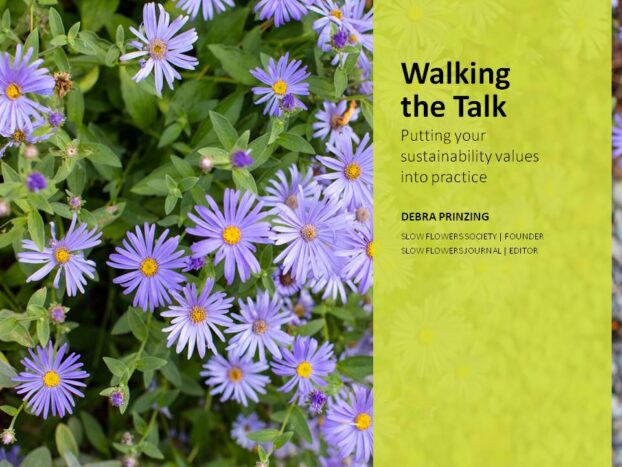
Let’s talk about the six values that are featured in the Slow Flowers Manifesto, and I’ll break them down by theme and what our members are doing to really reflect those values.
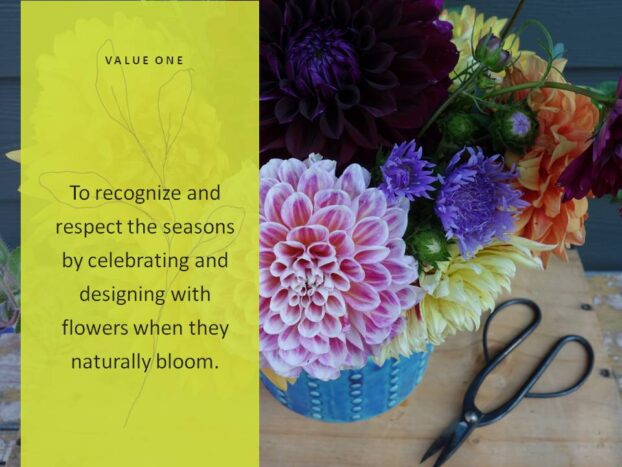
Our first value is “To recognize and respect the seasons by celebrating and designing with flowers when they naturally bloom.”
As a guiding principle, we are influenced by what we see in the Slow Food movement, where people are saying, “To really celebrate flavor and the best food available is to eat it in season.” The strawberry’s lack of flavor in January is a frequent example given, but if you get it right off the vine or right off the plant in the middle of summer, there’s nothing more pure as the essence of season.
Similarly, we see this in the flower world. I think the idea of seasonality is universal and relatable to gardeners, and it certainly makes sense to me, since I come out from horticulture as a garden writer. During the pandemic, we saw something like 23 million new people who entered gardening during the shut-down. Having conversations about seasonality is important, because people are understanding they need to connect to nature more than ever.
The phrase “Slow Flowers” first appears in my books. I wrote The 50 Mile Bouquet in 2012 and used the phrase Slow Flowers throughout that book, kind of as a shorthand to explain to people what the topic was about.
The following year in 2013, I wrote a follow-up book called Slow Flowers, in which I set out to create a bouquet each week from my cutting garden in Seattle, using what grew there in season. It was a experiment to say, “You know what? There’s a dormant season in winter; it’s quieter, my design palette includes twigs and conifers. I asked: Can I create an arrangement as aesthetically pleasing as an expression of the current season, with as much excitement as I might during the peak of summer when everything’s exploding?”
The Slow Flowers book stimulated wonderful responses. There was a Slow Flowers Challenge in 2014 that started when one of my readers began using the hashtag #theslowflowerschallenge and sharing it on social media, asking other gardeners to join her. Inspired by her effort, we took it upon ourselves to create an opportunity for everybody to post and share images of their seasonal, garden-inspired arrangements. Flower lovers, gardeners, and florists joined in to create an arrangement every week, posting and sharing — it really exploded.
While I was out presenting lectures and presentations at flower shows, garden clubs, and other venues, I heard from audiences who said to me, “Okay, Debra, I’ve drunk the Kool-Aid; I believe in what you’re talking about, but how do I find farmers and florists who are sourcing locally?”
I was asked the same question by my peers in the media who were interested in the renaissance that was taking place in our floral marketplace. In response, I launched Slowflowers.com in 2014, and began to use the platform to highlight our members as sources for local flowers.
Flower farmers and florists joined Slowflowers.com very early on to be part of the Movement. For example, farmer-florist Beth Syphers of Salem, Oregon-based Crowley House Flower Farm, joined as a member. She uses her association to promote the unique garden roses and other amazing crops her farm grows for the floral trade.
I was really fortunate, at the very beginning of this journey, to partner with local flower farmers in the Pacific Northwest, including those who formed the Seattle Wholesale Growers Market in 2011, including Crowley House Flower Farm. I like to say I was their embedded journalist.
The farmers of the Seattle Wholesale Growers Market are focused on bringing premium couture flowers to the florists of their region. They have differentiated local flowers from imported flowers and commercially-grown flowers.
I attribute the secret of their success to specializing in flowers that can’t be shipped or only bloom for a short period of time, like the beautiful lilacs which are grown by Jello Mold Farm in Washington’s Skagit Valley. Jello Mold is pictured on the cover of The 50 Mile Bouquet and you heard owners Diane Szukovathy and Dennis Westphall on this podcast recently. As a storyteller, by partnering with the Growers Market and its farmers, I focused more people’s attention on locality of flowers.
The natural evolution of interviewing flower farmers led to connections with their customers, who are the florists, like Melissa Feveyear of Terra Bella Flowers, based in Seattle. She highlights seasonal flowers in her shop and educates her customers about her farm sources as part of her branding, such as her Instagram post: “Support Local Growers.” In fact, Melissa was a founding member of the Seattle Wholesale Growers Market, the only florist to join with the growers in launching the co-op.
These actions inspired other florists. Tammy Myers, of First & Bloom, also in the Seattle area, specializes in locally grown and American grown everyday flowers. She is rebranding for 2023 with the “eco-florist” tagline. After 9 years in business, her mission hasn’t changed.
Melissa and Tammy are among 850 florists and flower farmers, farmer-florists, retailers, wholesalers, and designers who are Slow Flowers Society practitioners.
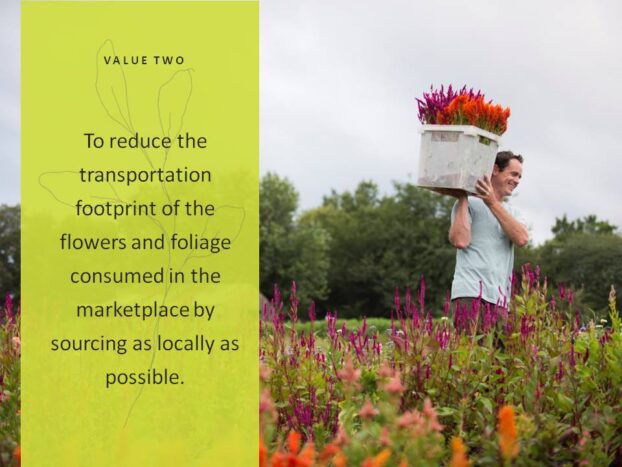
Clearly, we all can see the benefits of supporting local flowers –our first mandate. These concepts inform value number two, which is really all about the transportation footprint.
In the past decade especially, as our community of flower farmers and floral designers, consumers and floral enthusiasts is gaining momentum, we are seeing people who view their floral purchases in the same way they spend their food dollars, with the goal of sourcing our flowers as close to home as possible. In North America, that’s obviously a challenge, because many areas have winter weather conditions, and so that’s where we really rely on flowers from warmer states like Hawaii, California, Florida, or even Oregon and Washington, but local is clearly the value that segues into this issue of the flower transportation conversation.
We wanted to know consumer attitudes about the correlation between where their flowers are grown and how they are purchased.
There hasn’t been a baseline understanding of consumer attitudes and behaviors for a long time, in terms of understanding their concern about local. In 2021, we partnered with the National Gardening Association and their annual National Garden Survey, which conducts a scientifically accurate survey of 2,500 households across the US, mainly asking them about lawn and garden trends and purchases and behaviors.
For two years, we have asked, “How important is it to you that the flowers you purchase are locally grown?”
In 2022, 65% said it is very or somewhat important; and that is up from 58% in 2021. This is very encouraging. We’re going to keep asking this question and measuring how the trend line is going.
We asked a second question, “How important is it to you to buy US grown cut flowers?” The response was not quite as high as the question around local flowers, but it’s still impressive, with 61% of respondents saying it is very or somewhat important; and that is up from 57% in 2021.
The National Gardening Survey is consumer-focused, which is why we also survey Slow Flowers members every year on issues and concerns that relate to their businesses. As I mentioned earlier our members include flower farmers, florists, studio and wedding and event florists, retail florists, and also people that define themselves as farmer-florists, as well as wholesalers and suppliers.
This past year, we asked, “What type of local support are you currently experiencing?”
89% of our respondents said that more customers are interested in my floral enterprise because it’s local.
45% said more customers are requesting locally grown flowers for their designs, so that’s really affirming.
Let’s talk about some of the things that we are seeing in context of the transportation footprint. The old-fashioned, original dictionary definition of FLORIST is one who is in the business of raising or selling flowers and ornamental plants. It’s a concept that’s having a comeback because of the Slow Flowers movement and an interest in locally grown flowers.
So, we asked our members, “What percentage of the flowers used in your designs do you grow yourself?”
A very large percentage, 55%, said that they grow 76 to 100% of the flowers used in their own designs. Only about 10% of our respondents saying they don’t grow any of their own flowers.
As an extension, we asked, “How important is it to you and your business to purchase US made products for use in your floral designs?” This relates more to the whole issue of hard goods and accessories. A year ago, we hadn’t quite felt the pinch of supply chain.
Now, we’re seeing an increased focus on reusing vases, recycling, repurposing — a lot of innovation is taking place in fighting supply chain challenges. I just wanted to mention one interesting example of this way to address supply shortages. Tammy Myers, of First & Bloom, who I mentioned in the first section recently partnered with an organization here in Seattle called Ridwell. Ridwell is a private recycling company that takes items that municipalities don’t have a recycling method for, including light bulbs and batteries and plastic bags. Tammy created a pilot project with Ridwell to recycle glass vases that homeowners have collected under their sinks or in cupboards. I believe they ran this project in two neighborhoods with an overwhelming response.
Tammy has created vase collections of these recycled vessels, by shape and size, from bud vases to centerpiece sizes, and is re-selling them at an affordable rate to cover her costs to supply local florists who need a regular quantity of vases and have had trouble sourcing them. We’ll be following this story as it unfolds. It’s encouraging to see how one person has diverted used glass vases from landfills.
To understand local, we wanted to explore flower sourcing and that goes back to the farm and the wholesaler. What does local mean? Some of the things that people would consider local include growing your own cutting garden; wild-gathering, buying farm-direct, or ordering from a farm one or two state away, or shopping for Certified American Grown flowers. I like to describe it as the pebble in the pond approach, with the goal of sourcing as close to home as possible.
When I wrote The 50 Mile Bouquet, I was very much inspired by the food mile, so I started my own cutting garden. I like to call it the five-step bouquet, because it is right outside my backyard.
Major wholesalers are responding to florist requests for local and American grown flowers, like a poster that Mayesh Wholesale Florist hung in their Portland branch, which reads: “Mayesh is Proud to Offer Local + American Grown Product,” and they’ve used this graphic on some of their sponsorship branding with Slow Flowers.
We know, good or bad, that grocery accounts for 50% of all floral sales and grocery customers want locally grown flowers. But not all grocery stores put a priority on supplying domestic or local flowers. We are thrilled that Town & Country Markets, a family- owned grocery chain in the Seattle area with six stores, are Slow Flowers members. Every year, Town & Country produces a special floral department promotion during American Flowers Week to highlight the local flower farms, which, of course, we love.
Whole Foods, certainly before their Amazon ownership, and even now, region by region, partners with local farmers. Our members Chet and Kristy Anderson of The Fresh Herb Company in Boulder, Colorado, for example, supply all of the Whole Foods branches in the Rocky Mountain region. Their program is so big, they’re delivering flowers to the Whole Foods distribution center, which supplies something like 12 stores across the Rocky Mountain region.
Individual Whole Foods stores also partner with growers to bring hyper-local flowers to their customers. For example, the Williams family of WilMor Farms in Metter, Georgia, supply the Whole Foods outlet in Savannah, Georgia. They support WilMor Farms with in-store signage, at the point-of-purchase and on bunches and bouquet labels.
I encourage people to define local on their own terms. If you put in the work, you can find local flowers everywhere. Yet LOCAL is a rather elusive term. We researched whether there was a U.S. Government definition of “Local.” The USDA’s Consolidated Farm and Rural Development Act defines local as a maximum 400-mile distance between where a product is produced and where it is consumed, or in the state in which the product is produced.
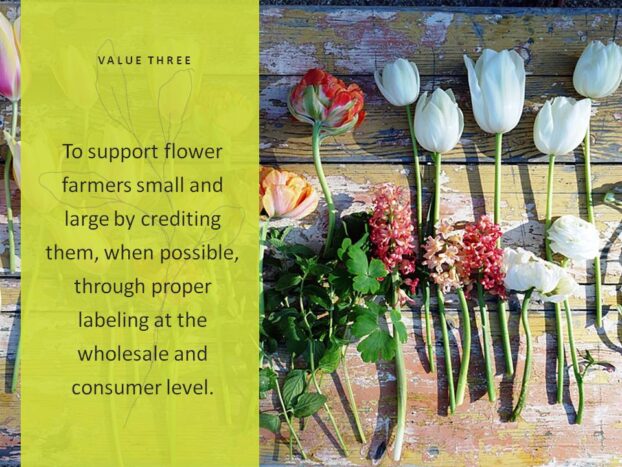
Okay, let’s talk about Value Number Three. “To support flower farmers small and large by crediting them, when possible, through proper labeling at the wholesale and consumer level.”
When we see florists including “local messaging” into their branding, we know it captures the imagination of clients who care about how their money is spent. By supporting farmers small and large when we credit them, it helps everyone who is in the business of selling domestic and local flowers. This is very much about transparency in labeling. When people join Slow Flowers Society as a member, we say to them, “You don’t have to be 100% local or domestic in your sourcing, you just have to be willing to be transparent with consumers. If someone’s asking for local flowers in a particular category, for example, and you can’t supply it because you only have imported, you just have to be honest and tell them.” Through education, we’re encouraging flower farmers to develop relationships or partnerships with wholesalers. With strong farmers, with an increase in flower farming as a viable economic enterprise in agriculture, the equation benefits us all.
There has been a huge explosion of regional wholesale models, including collectives, cooperatives and other marketing networks. Inspired by the Seattle Wholesale Growers Market, which opened in 2011, regional hubs are popping up across North America, as farmers open their own wholesale operations to sell direct to florists.
Every single week I receive an inquiry from somebody who wants resources on how to start their own collective in their region, perhaps with as few as three flower farmers coming together with a central location to sell their flowers. You can learn more in the webinar that we produced with Johnny’s Seeds in 2021, called Producer Cooperatives for Small Scale Farms, which is available for free to watch on their website.
There are also new online selling platforms emerging to help flower farmers with technology, so Gather Flora is out of the West Coast in California, Rooted Farmers is based out of the East Coast. Each of these models has unique proprietary software, created by people who saw a need for a platform that allows farmers to upload their inventory and make it easy for florists to shop from multiple farms at once, so this is a real connection, a missing link. When I started slowflowers.com, I envisioned that Slow Flowers would be a tool to help consumers and florists find flower farmers, but I’m not an eCommerce expert and I never wanted to do transactions through the site, so I really applaud these groups that are coming together to solve that pain point to help flower farmers sell their product professionally to florists.
I mentioned earlier the benefit to florists who base their brands on local sourcing, and here’s just one florist I want to highlight. Pilar Zuniga is based in the Oakland area. Her studio is called Gorgeous and Green and her online store prominently offers local flowers.
Not only do I think this is really important, we often see florists who feature their farm sources on their blogs and websites. For example, Grace Flowers Hawaii on the Big Island, owned by Allison Higgins, recently posted a story about Daisy Dukes Farm, which is one of their local flower sources, which we love to see. These are simple things anybody can do, in terms of just educating your customers about your values.
Hometown Flower Company, our members based on Long Island, is another example. Owner Jaclyn Rutigliano is a third-generation florist, whose family were conventional florists. She has reimagined a new model for floristry, saying, “I want to focus on local.” One of the ways Hometown Flower Company communicates this brand attribute is through a map of Long Island that shows exactly where their flower farms and partners are located along the island. It’s really fun to see this map and realize that one little business is supporting a lot of flower farmers.
Back to our Slow Flowers member surveys, we captured florists’ increasing desire to go to the source, which is completely disrupting how flowers are sold. We asked our members, “What percentage of your cut flower purchases are through farm-direct channels?” Almost 40% report that it’s 76 to 100% of how they buy flowers. I just want to comment that this trending pattern is exactly one of the reasons why wholesalers are ramping up their focus on local-sourced flowers within their branches, using signage and labeling to telegraph that they, too, are working with local florists.
In last year’s member survey we also asked, “If you purchase from conventional wholesale florists, are you finding more American grown and local options than in the past?”
70% of our respondents said yes, so I think that’s just something that we’re going to see more of across the board. And this is an encouraging trendline.
Value number four: “To encourage sustainable and organic farming practices that respect people and the environment.”
You can see a great example of this value on the homepage of Le Mera Gardens, in Ashland, Oregon. Joan Thorndike has operated Le Mera Gardens for more than 30 years. Long before Slow Flowers was even a term, Joan sought organic certification. She says, as a mother who always had her children on the farm with her, she wanted her children to be safe, but she also wanted her florists and their children to be safe and their consumers to be safe.
We discussed florists who feature the farms they source from – as a way to inform their customers. Joan has flipped it around and she lists the florists who carry Le Mera’s local flowers. Joan wants to let people know, “Here are the florists who buy their flowers from our farm; please go patronize them.” I love this reciprocity.
In terms of Sustainability, there are many definitions, but one widely used example is a definition from the United Nations: “Meeting the needs of the present without compromising the ability of future generations to meet their own needs.”
So, what does it mean in the floral trade? I love a little sign I found years ago on a counter of a flower shop in Portland that reads: “We compost all floral cuttings.” It’s just a simple sign that goes a long way to communicate sustainability. That particular florist was located next to a farm-to-table restaurant, which made a big deal about composting their food waste, so she felt like she wanted to get in on that act, and it was a small but smart gesture. Kelsey Ruhland of Foxbound Flowers in Eugene, Oregon, recently shared that she weighs her flower waste every single week before putting it into the municipal compost collection, because she’s trying to document, over the course of a year, how much flower waste she’s composting, which is an extra step. Clearly it takes work – and intentionality – to be sustainable. But letting your market know what you’re doing is important.
One of the best ways to teach the values of sustainable flowers takes place when consumers and florists can step onto a flower farm. We did a report for Johnny’s Seeds featuring the ways that farmers are staging on-farm events as an education, a marketing, and a community-building tool.
Staging open houses or farm tours clearly nurture organic, in-person connections between consumers and local flowers. The Seattle Wholesale Growers Market, especially before COVID, regularly held open days at their member farms. Usually held on a Sunday, families were invited for a day of festivities, and a lot of florists came for the country experience and to see where the flowers that they buy, week in and week out, were grown.
There are a few other sustainable themes I’d like to discuss. As a home gardener who is 100% organic in my own backyard, I understand sustainable farming practices. While I don’t plant cover crops, there are some practices I emulate, such as rotating planting areas and harvesting rainwater.
Not all flower farms can achieve a USDA organic certification. There are other third-party designations that evaluate sustainable practices, such as the Certified Naturally Grown program, a peer-to-peer farmer evaluation that was formed because of all the rigor and difficulty of becoming certified through the USDA.
In the Pacific Northwest we see farms seeking Salmon-Safe certification. This is a label seen on Oregon and Washington wines as a way to telegraph to consumers that their vineyard farming practices have been designated to be safe for salmon habitat. The flower farmers at the Seattle Wholesale Growers Market have gone through this evaluation and they view it as another way to communicate to consumers that they’re serious about their practices.
At Jello Mold, Diane Szukovathy and Dennis Westphall have also hosted floral departments from local grocery stores, so that the staff gain product knowledge and education. At Right Field Farm in Maryland, outside of Washington, D.C., David Brunton and his family send a weekly email to their CSA customers. The email tells everybody what’s happening on this small family farm; what they’re growing; something unique about a particular variety that’s available that week; where people can also buy their flowers at the local natural grocery store. The highly personalized communication nurtures authentic connections between people and flowers.
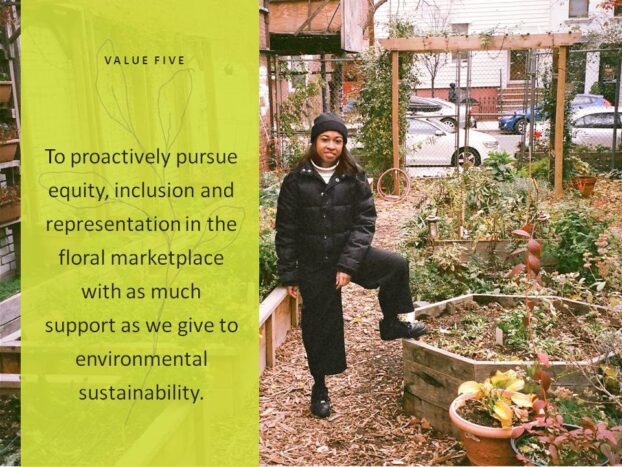
We added Value Five in 2020. This was an important action, in response to our desire to proactively pursue equity, inclusion and representation in the floral marketplace with as much support as we give to environmental sustainability.
Personally, I was inspired by one of my mentors, a Black horticulture professional and friend through the gardening industry; She pointed out that the missing component of sustainability so often overlooked is human sustainability.
We believe that supporting environmental sustainability is only part of the equation. We have to show we care as much about representation, inclusion, and equity in the floral industry as we do our environmental choices, so this value five is really important.
Slow Flowers is committed to expanding our inclusion, representation and diversity, including through our partnership with Bloom Imprint, which is our book publishing venture owned with Robin Avni. Earlier in 2022, Bloom Imprint published Black Flora by Teresa J. Speight, which features top Black farmers and florists across the U.S.
Black Flora amplify the voices of not only floriculture professionals, but agricultural and horticultural professionals. Why is it important to feature Black florists and flower farmers? When young and emerging floral professionals see someone who looks like them practicing professionally, it sends such a important message about the values that we have. Among the many other inspiring floral entrepreneurs, you’ll want to meet Dee Hall of Mermaid City Flower Farm in Norfolk, Virginia. She started Black Flower Farmers last year as a community group for specialty cut flower growers across the U.S., and we really want to support this expanding farming group.
Flower farmer Aishah Lurry owns Patagonia Flower Farm, and she is both a Slow Flowers member as well as active in the Black Flower Farmers group. Aishah has created an incredibly vibrant local business in a market that, honestly, never had local flowers, in Tucson, Arizona, so she’s really changing people’s definition of what’s local. When you see that she’s growing lisianthus and tulips in the high desert, it’s kind of mind-blowing. She’s just a real leader in the industry.
By supporting Black floral professionals and other people of color in the floral industry, we all benefit from connections and shared values. One leader is Valerie Crisostomo, an Atlanta-based wedding and event florist. She started Black Girl Florists in 2020 . It’s an organization much like Slow Flowers, a network of Black florists across the US. They’ve become a real important resource for each other and to share a unified voice. Black Girl Florists had their first conference in 2022, it included wedding and event professionals, as well as florists and flower farmers.
One of the other groups recently emerging on Instagram is Florists of Color, a feed to be celebrated. It’s hosted by Pilar Zuniga of Gorgeous and Green; I mentioned her earlier. A Latina florist, Pilar has expanded representation of all Florists of Color, including indigenous and Asian and Pacific Islanders and all Black and brown florists and flower farmers through the Instagram account. I encourage you all to join me in elevating and promoting representation and justice in the floral marketplace. Let’s ensure the growth and sustainability of the people in our profession.
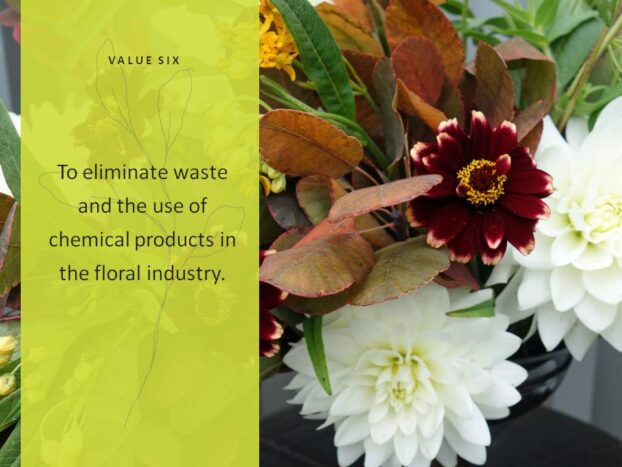
Let’s wrap up with our last value, value number six, “to eliminate waste and the use of chemical products in the floral industry.”
We just have to look at the media coverage around Queen Elizabeth’s recent funeral to see that the topic of floral industry waste is a global issue. I illustrated this point with a story published in September by CBC News in Canada, critiquing the amount of plastic wrapping accumulated from all the bouquets that were left at Buckingham Palace and other places to commemorate Queen Elizabeth.
Perhaps all those flower bouquet purchase were good for flower retailers, but the criticism generated by scenes of plastic trash by the container loads was disheartening, especially since most of that cellophane is not recyclable. One of our members, Becky Feasby of Prairie Girl Flowers, was quoted in the article questioning whether there are other ways that packaging can be changed to reduce plastic.
On a positive note, it was encouraging to also read coverage about the flowers in the wreath placed on Queen Elizabeth’s coffin — and the fact that they came from gardens that were important to both her and to King Charles III. I love this sentence that caught my eyes: “At His Majesty’s request, this wreath is made in a totally sustainable way, in a nest of English moss and oak branches, and without the use of floral foam.” I think we have Shane Connolly to thank for that influence on King Charles III.
Increasingly, people are concerned about the single-use plastics in the floral industry. In last year’s Slow Flowers Member Survey, we asked, “What percentage of your design work uses alternatives to floral foam?” 75% of our respondents said 75 to 100% of their work is foam-free.
We also asked our members to identify the foam-free mechanics they used. 95% of our respondents identified chicken wire, which, of course, we know about. The other top ones were pin frogs, hairpin frogs, Holly Chapple’s Syndicated eggs and cages, chicken wire and moss, taped grids, and other organic mechanics like branches.
Another organization you’ll want to check out is The Sustainable Floristry Network. Founded by Australian florist Rita Feldmann, SFN features several of our Slow Flowers members as ambassadors, including Susan McLeary, Becky Feasby, Pilar Zuniga, and Tobey Nelson. Slow Flowers has joined on as an advisor. One of their statements really moves me. It says: “We can’t wait for the day the Sustainable Floristry Network closes its doors. On that day, floristry will be carbon neutral, non-toxic and waste-free, with safe and fair conditions for all working in the industry. We’ll get there when all sides of floristry come together, creating a system that equally supports our passion, our livelihoods, and the planet
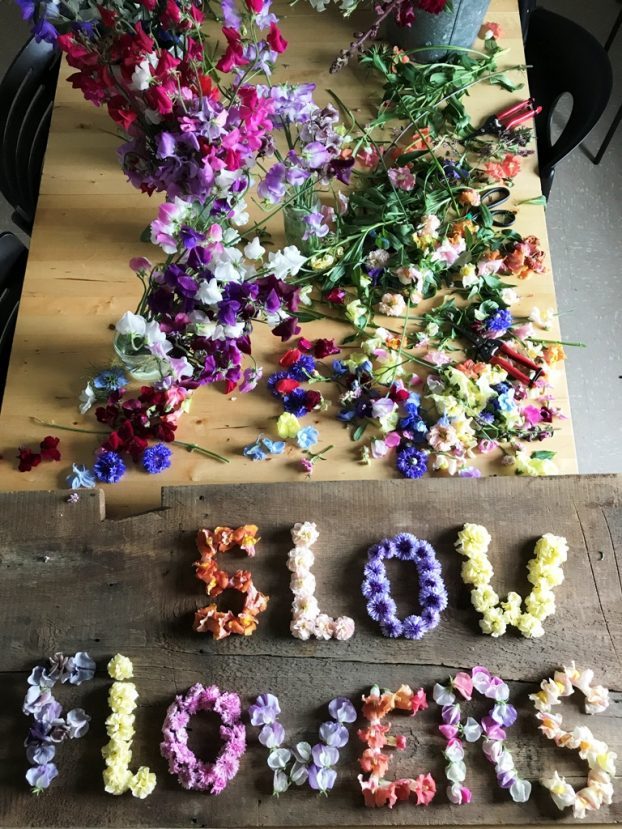
Slow Flowers supports this statement and Slow Flowers is synonymous with local, seasonal, and sustainable, and inclusive floristry and flower farming. Since our origins more than a decade ago, we have been advocating, often quietly and often seen as a fringe element in the marketplace, and now, it’s so gratifying to see what an influence we have brought to the industry, changing the conversation, and bringing our values into the mainstream.
I think everybody who gardens will find the mental health benefits of growing their own flowers. And when that happens, the floral consumer is enlightened and engaged in sustainable issues that relate to our profession.
There is so much more to share, and I hope you’ll get more involved, whether you’re already a member or if you wish to learn more. Click here to join us as a member!
Download PDF of the Walking the Talk slideshow below:
Thank you to our Sponsors
This show is brought to you by Slowflowers.com, the free, online directory to more than 850 florists, shops, and studios who design with local, seasonal and sustainable flowers and to the farms that grow those blooms. It’s the conscious choice for buying and sending flowers.
Thank you to our lead sponsor, Farmgirl Flowers. Farmgirl Flowers delivers iconic burlap-wrapped bouquets and lush, abundant arrangements to customers across the U.S., supporting U.S. flower farms by purchasing more than $10 million dollars of U.S.-grown fresh and seasonal flowers and foliage annually. Discover more at farmgirlflowers.com.
Thank you to CalFlowers, the leading floral trade association in California, providing valuable transportation and other benefits to flower growers and the entire floral supply chain in California and 48 other states. The Association is a leader in bringing fresh cut flowers to the U.S. market and in promoting the benefits of flowers to new generations of American consumers. Learn more at cafgs.org.
Thank you to Store It Cold, creators of the revolutionary CoolBot, a popular solution for flower farmers, studio florists and farmer-florists. Save $1000s when you build your own walk-in cooler with the CoolBot and an air conditioner. Don’t have time to build your own? They also have turnkey units available. Learn more at storeitcold.com.
Thank you to the Association of Specialty Cut Flower Growers. Formed in 1988, ASCFG was created to educate, unite, and support commercial cut flower growers. Its mission is to help growers produce high-quality floral material, and to foster and promote the local availability of that product. Learn more at ascfg.org.
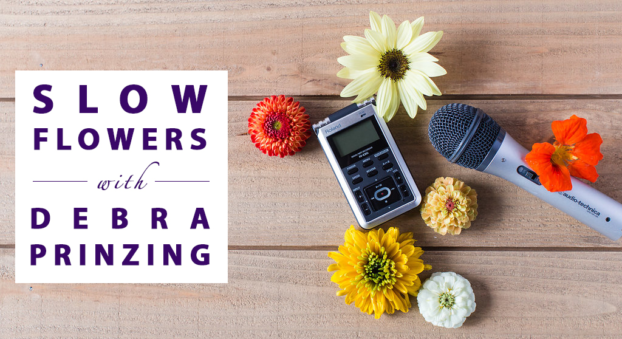
Thanks so much for joining me today! The Slow Flowers Podcast is a member-supported endeavor, downloaded more than 900,000 times by listeners like you. Thank you for listening, commenting and sharing – it means so much. As our movement gains more supporters and more passionate participants who believe in the importance of our domestic cut flower industry, the momentum is contagious. I know you feel it, too.
If you’re new to our weekly Show and our long-running Podcast, check out all of our resources at SlowFlowersSociety.com
I’m Debra Prinzing, host and producer of the Slow Flowers Show & Podcast. The Slow Flowers Podcast is engineered and edited by Andrew Brenlan. The content and opinions expressed here are either mine alone or those of my guests alone, independent of any podcast sponsor or other person, company or organization. Next week, you’re invited to join me in putting more Slow Flowers on the table, one stem, one vase at a time.
Music credits:
Enter the Room; Turning on the Lights; Gaena
by Blue Dot Sessions
http://www.sessions.blue
Lovely
by Tryad
http://tryad.bandcamp.com/album/instrumentals
http://creativecommons.org/licenses/by-sa/3.0/
In The Field
audionautix.com










